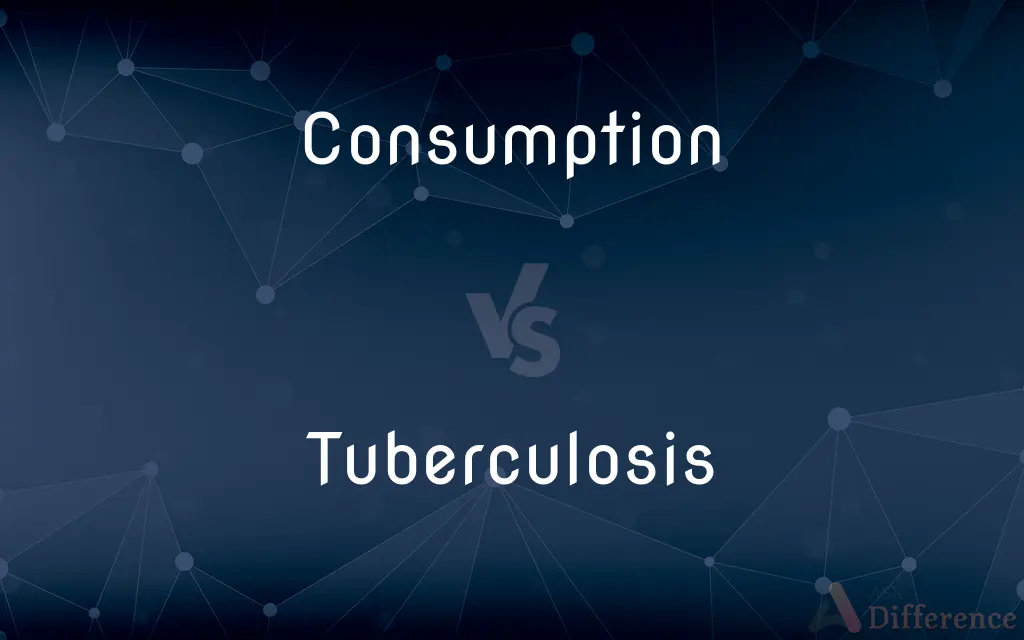Consumption vs. Tuberculosis — What's the Difference?
By Tayyaba Rehman & Fiza Rafique — Updated on April 8, 2024
Consumption historically refers to the wasting away of the body, particularly from tuberculosis (TB), while tuberculosis is a specific bacterial infection that causes this condition.

Difference Between Consumption and Tuberculosis
Table of Contents
ADVERTISEMENT
Key Differences
Consumption, in historical contexts, was the term used to describe the severe weight loss, weakness, and fever associated with what is now known as tuberculosis. Tuberculosis, on the other hand, is caused by the bacterium Mycobacterium tuberculosis and primarily affects the lungs, though it can spread to other parts of the body.
While consumption emphasized the observable effects of the disease, such as wasting and decline in health, tuberculosis refers specifically to the underlying infectious disease. The shift from "consumption" to "tuberculosis" reflects a deeper understanding of the disease's cause and nature, moving from a description of symptoms to identifying the specific pathogen responsible.
Understanding the history of tuberculosis and the term "consumption" sheds light on the evolution of medical science and public health. The fight against tuberculosis also highlights the importance of early detection, vaccination, and antibiotic treatment in managing and controlling infectious diseases.
The transition from using "consumption" to "tuberculosis" illustrates the progress in medical knowledge, from observing the effects of diseases on the body to understanding their causes, leading to more effective treatments and prevention strategies. While consumption painted a bleak picture of inevitable decline, the identification of tuberculosis opened the door to combating the disease through scientific advancements.
Comparison Chart
Definition
Historical term for the wasting disease now known as tuberculosis.
An infectious disease caused by Mycobacterium tuberculosis, primarily affecting the lungs.
ADVERTISEMENT
Focus
Describes the physical decline and symptoms observed in patients.
Identifies the specific bacterium causing the infection and its effects.
Historical Context
Used before the causative agent of TB was discovered.
Usage began with the discovery of the TB bacterium in the 1880s.
Perception
Seen as a mysterious and inevitable condition.
Recognized as a contagious disease that can be treated and prevented.
Treatment and Prevention
Lacked effective treatment options before the bacterium's discovery.
Treatable with antibiotics and preventable with vaccines and public health measures.
Compare with Definitions
Consumption
Associated with significant weight loss and weakness.
The classic symptoms of consumption included a persistent cough and night sweats.
Tuberculosis
Focuses on the causative agent and its eradication.
Public health efforts to combat tuberculosis include vaccinations and improving living conditions.
Consumption
Reflected the lack of medical understanding of tuberculosis.
Consumption was feared and stigmatized due to its mysterious nature and inevitable outcome.
Tuberculosis
A bacterial infection that can lead to severe respiratory problems.
Tuberculosis remains a major health challenge in many developing countries.
Consumption
Symbolized the gradual decline of health.
Families often moved to warmer climates in a bid to cure consumption.
Tuberculosis
Preventable with vaccination (BCG vaccine).
The BCG vaccine has significantly reduced tuberculosis incidence in children.
Consumption
A term once used to describe the debilitating effects of tuberculosis.
In the 19th century, many artists and writers succumbed to consumption.
Tuberculosis
Identified by the discovery of Mycobacterium tuberculosis.
The identification of Mycobacterium tuberculosis was a breakthrough in medical science.
Consumption
The act or process of consuming.
Tuberculosis
Tuberculosis (TB) is an infectious disease usually caused by Mycobacterium tuberculosis (MTB) bacteria. Tuberculosis generally affects the lungs, but can also affect other parts of the body.
Consumption
The state of being consumed.
Tuberculosis
An infectious disease of humans and animals caused by the tubercle bacillus and characterized by the formation of tubercles on the lungs and other tissues of the body, often developing long after the initial infection.
Consumption
An amount consumed.
Tuberculosis
Tuberculosis of the lungs, characterized by the coughing up of mucus and sputum, fever, weight loss, and chest pain.
Consumption
(Economics) The using up of goods and services by consumer purchasing or in the production of other goods.
Tuberculosis
(pathology) An infectious disease of humans and animals caused by a species of mycobacterium, usually Mycobacterium tuberculosis, mainly infecting the lungs where it causes tubercles characterized by the expectoration of mucus and sputum, fever, weight loss, and chest pain, and transmitted through inhalation or ingestion of bacteria.
Consumption
A progressive wasting of body tissue.
Tuberculosis
A constitutional disease caused by infection with Mycobacterium tuberculosis (also called the Tubercle bacillus), characterized by the production of tubercles in the internal organs, and especially in the lungs, where it constitutes the most common variety of pulmonary phthisis (consumption). The Mycobacteria are slow-growing and without cell walls, and are thus not affected by the beta-lactam antibiotics; treatment is difficult, usually requiring simultaneous administration of multiple antibiotics to effect a cure. Prior to availability of antibiotic treatment, the cure required extensive rest, for which special sanatoriums were constructed.
Consumption
Pulmonary tuberculosis. No longer in scientific use.
Tuberculosis
Infection transmitted by inhalation or ingestion of tubercle bacilli and manifested in fever and small lesions (usually in the lungs but in various other parts of the body in acute stages)
Consumption
The act of eating, drinking or using.
The consumption of snails as food is more common in France than in England.
Consumption
The amount consumed.
Gross national consumption
Consumption
The act of consuming or destroying.
The fire's consumption of the forest caused ecological changes.
Consumption
(pathology) The wasting away of the human body through disease.
Consumption
Pulmonary tuberculosis and other diseases that cause wasting away, lung infection, etc.
Consumption
The act or process of consuming by use, waste, etc.; decay; destruction.
Every new advance of the price to the consumer is a new incentive to him to retrench the quality of his consumption.
Consumption
The state or process of being consumed, wasted, or diminished; waste; diminution; loss; decay.
Consumption
The process of taking food into the body through the mouth (as by eating)
Consumption
Involving the lungs with progressive wasting of the body
Consumption
(economics) the utilization of economic goods to satisfy needs or in manufacturing;
The consumption of energy has increased steadily
Consumption
The act of consuming something
Common Curiosities
Why did the term consumption fall out of use?
As medical understanding of tuberculosis advanced, the term "consumption" was replaced by "tuberculosis," reflecting knowledge of its bacterial cause.
What causes tuberculosis?
Tuberculosis is caused by the bacterium Mycobacterium tuberculosis.
Was consumption considered contagious?
The contagious nature of consumption was not fully understood until tuberculosis was identified as a bacterial infection.
What are the symptoms of tuberculosis?
Symptoms include a persistent cough, fever, night sweats, and weight loss.
Can tuberculosis be cured?
Yes, tuberculosis can be cured with a proper course of antibiotics.
How did people historically treat consumption?
Treatments were largely ineffective and based on improving general health through rest and climate change.
What is consumption?
Consumption is an outdated term for tuberculosis, highlighting the disease's physical wasting effects.
Is there a vaccine for tuberculosis?
Yes, the BCG vaccine is used to prevent tuberculosis, especially in children.
How is tuberculosis transmitted?
Tuberculosis is transmitted through the air when people with active TB in their lungs cough, speak, or sneeze.
What public health measures help control tuberculosis?
Measures include vaccination, early detection and treatment of active cases, and monitoring and treatment of latent infections.
How was tuberculosis discovered?
The discovery of Mycobacterium tuberculosis by Robert Koch in 1882 marked a significant milestone in understanding the disease.
Can tuberculosis affect parts of the body other than the lungs?
Yes, tuberculosis can spread and affect other parts of the body, known as extrapulmonary tuberculosis.
What is latent tuberculosis?
Latent tuberculosis is when the bacteria remain in the body in an inactive state without causing symptoms.
Why is tuberculosis still a global health issue?
Despite advancements, tuberculosis remains a challenge due to factors like antibiotic resistance and inadequate public health measures in some regions.
What impact did the discovery of antibiotics have on tuberculosis?
The introduction of antibiotics dramatically changed the treatment of tuberculosis, making it a curable disease.
Share Your Discovery

Previous Comparison
Filtrate vs. Distillate
Next Comparison
Insight vs. OnsightAuthor Spotlight
Written by
Tayyaba RehmanTayyaba Rehman is a distinguished writer, currently serving as a primary contributor to askdifference.com. As a researcher in semantics and etymology, Tayyaba's passion for the complexity of languages and their distinctions has found a perfect home on the platform. Tayyaba delves into the intricacies of language, distinguishing between commonly confused words and phrases, thereby providing clarity for readers worldwide.
Co-written by
Fiza RafiqueFiza Rafique is a skilled content writer at AskDifference.com, where she meticulously refines and enhances written pieces. Drawing from her vast editorial expertise, Fiza ensures clarity, accuracy, and precision in every article. Passionate about language, she continually seeks to elevate the quality of content for readers worldwide.














































